-
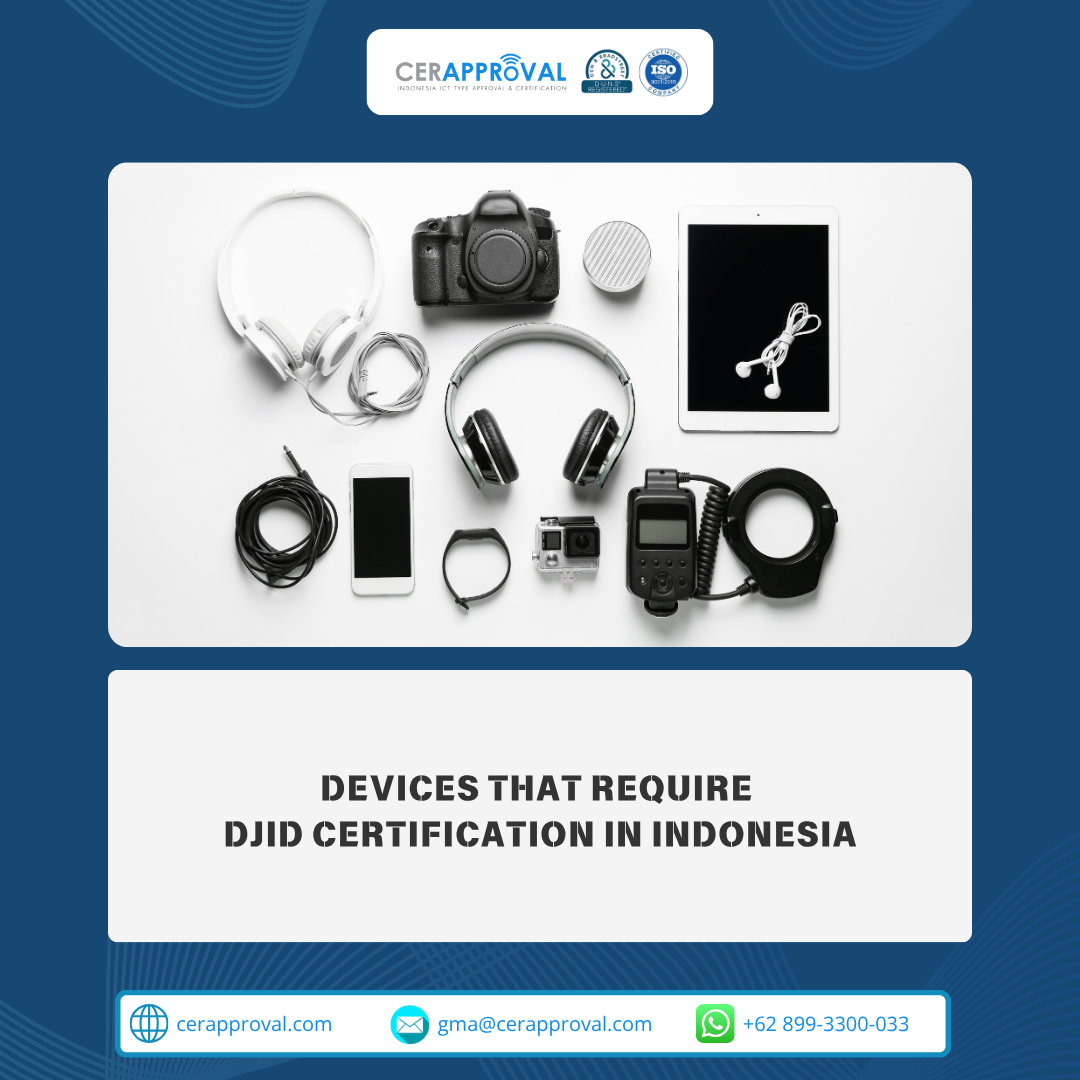
Devices That Require DJID Certification in Indonesia
Devices That Require DJID Certification in Indonesia If you are planning to import, distribute, or sell wireless or telecom devices in Indonesia, you must ensure they are certified by DJID (formerly SDPPI) under the Ministry of Communication and Digital (Komdigi). What is DJID/SDPPI Certification? DJID certification is a mandatory technical and regulatory approval for any device using radio frequency (RF). This ensures that the device complies with local technical standards and does not interfere with licensed frequencies. Common Devices That Require Certification 🔹 Bluetooth Devices – TWS earbuds, wireless headsets, smartwatches, wireless printers. 🔹 Wi-Fi / RLAN Devices – Access
-
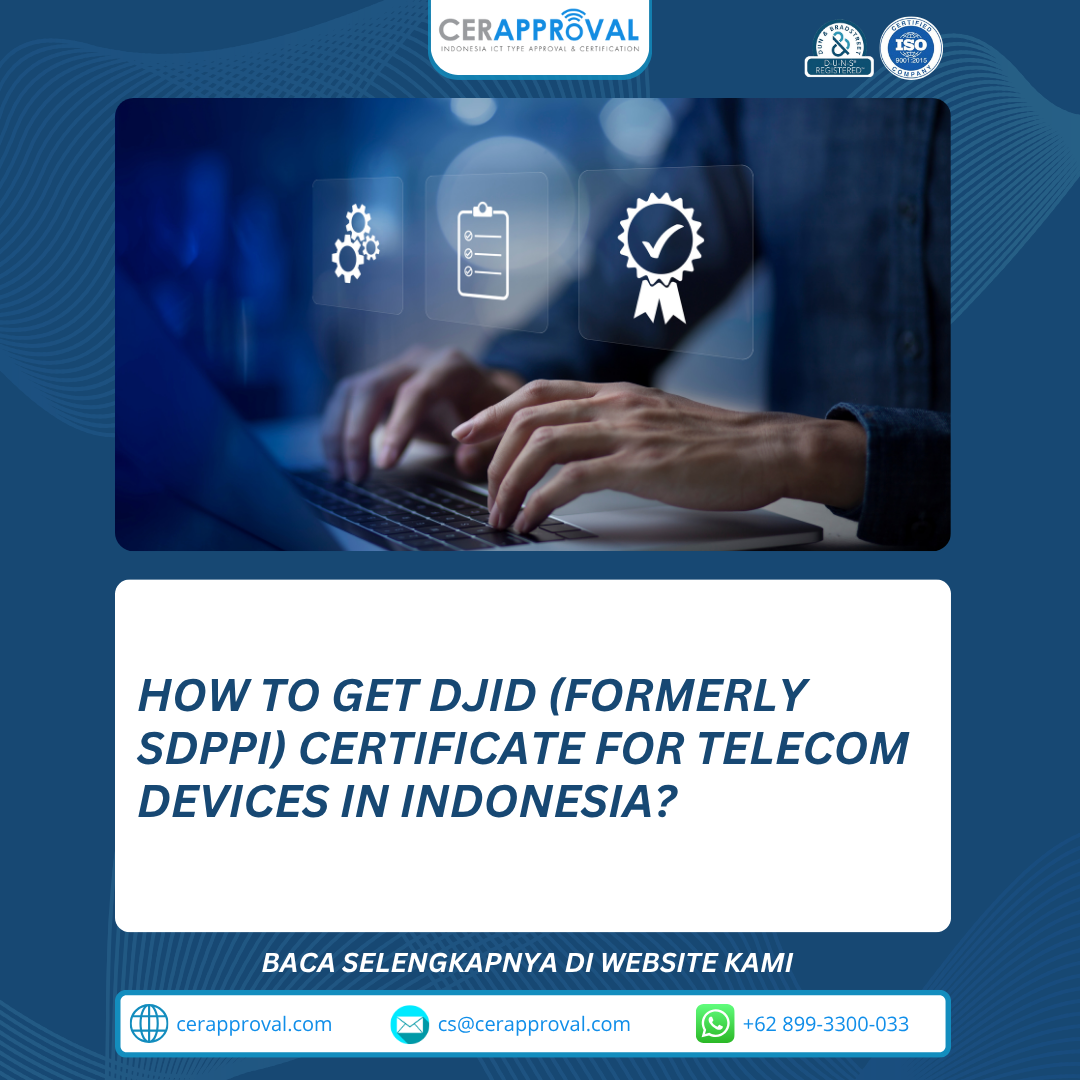
How to Get DJID (Formerly SDPPI) Certificate for Telecom Devices in Indonesia?
Obtaining DJID (formerly SDPPI) certification is a crucial step for companies that wish to market or sell their telecom equipment in Indonesia. This process guarantees that your products meet the country’s technical standards and regulations enforced by the Ministry of Communication and Digital (Komdigi). Why Is DJID Certification So Important? Having a DJID certificate is essential for: ✅ Ensuring your products are compliant with Indonesian regulations. ✅ Providing safety, interoperability, and high performance for your users. ✅ Preventing penalties or legal issues due to non-compliance. ✅ Boosting consumer confidence in your products’ credibility and authenticity. The Process of DJID Certification
-
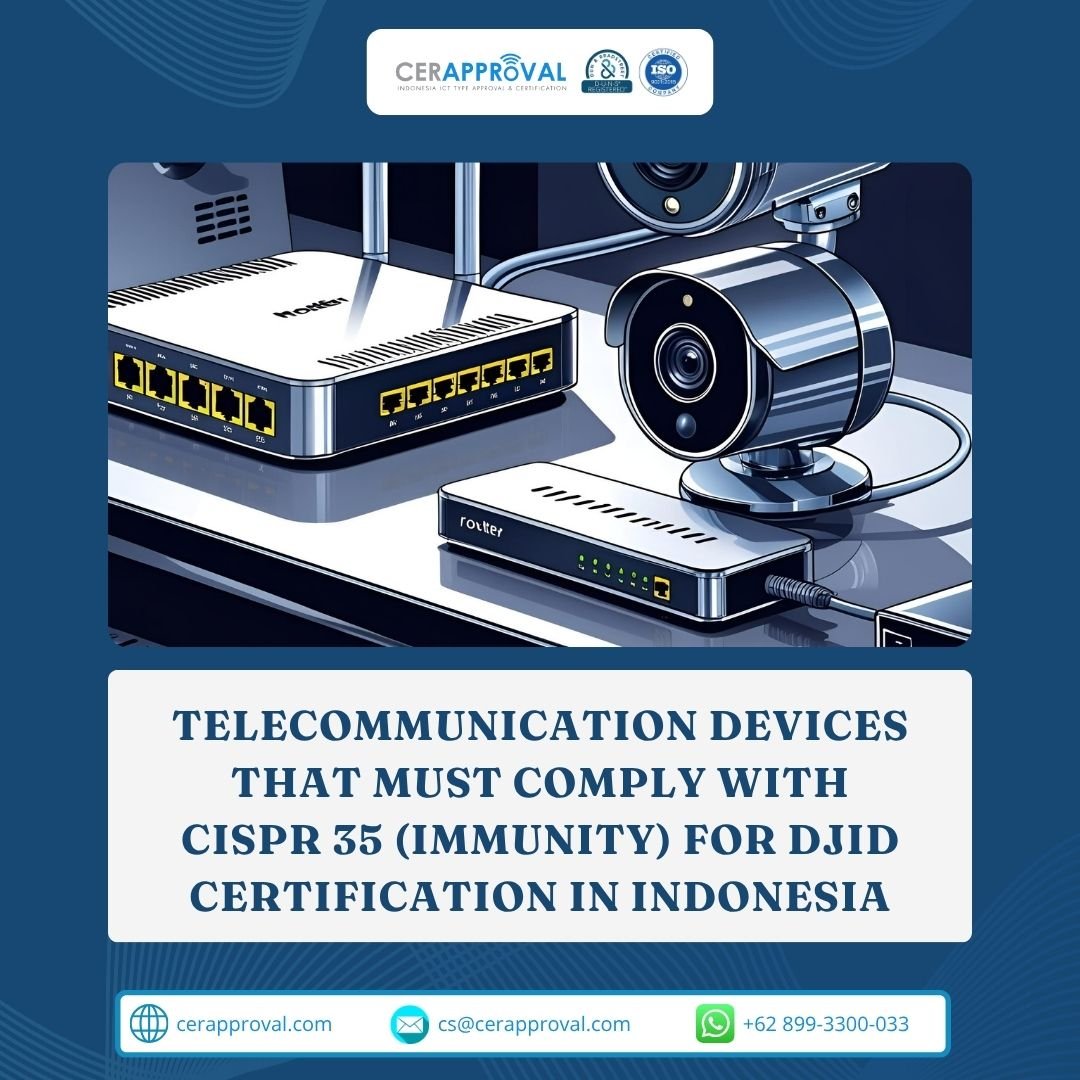
Telecommunication Devices That Must Comply with CISPR 35 (EMC Immunity) for DJID Certification in Indonesia
In 2025, the Directorate General of Digital Infrastructure (DJID) — formerly known as SDPPI Kominfo — will officially require EMC immunity testing according to CISPR 35 standards for various telecommunication devices submitted for certification in Indonesia. This regulation is part of the government’s effort to harmonize national certification standards with international best practices and to ensure devices are resistant to electromagnetic interference (EMI) in real-world environments. What is CISPR 35? CISPR 35 is an international standard from IEC that governs immunity testing — a measure of a device’s ability to function normally when exposed to electromagnetic disturbances. The standard includes
-

Nemko Korea Approved as Official MRA Test Lab for DJID Certification in Indonesia
Effective May 27, 2025, the Ministry of Communications and Digital Affairs of the Republic of Indonesia (KOMDIGI), through the Directorate General of Digital Infrastructure (DJID), has officially approved Nemko Korea Co., Ltd. as a recognized foreign testing laboratory under the Mutual Recognition Arrangement (MRA) framework. This approval enables Nemko Korea to issue test reports that are valid for device certification submissions to DJID Indonesia, streamlining the market entry process for global manufacturers. Background: MRA Between Indonesia and Korea This appointment is based on the Mutual Recognition Arrangement between: The Ministry of Communications and Informatics of Indonesia The Ministry of Science
-
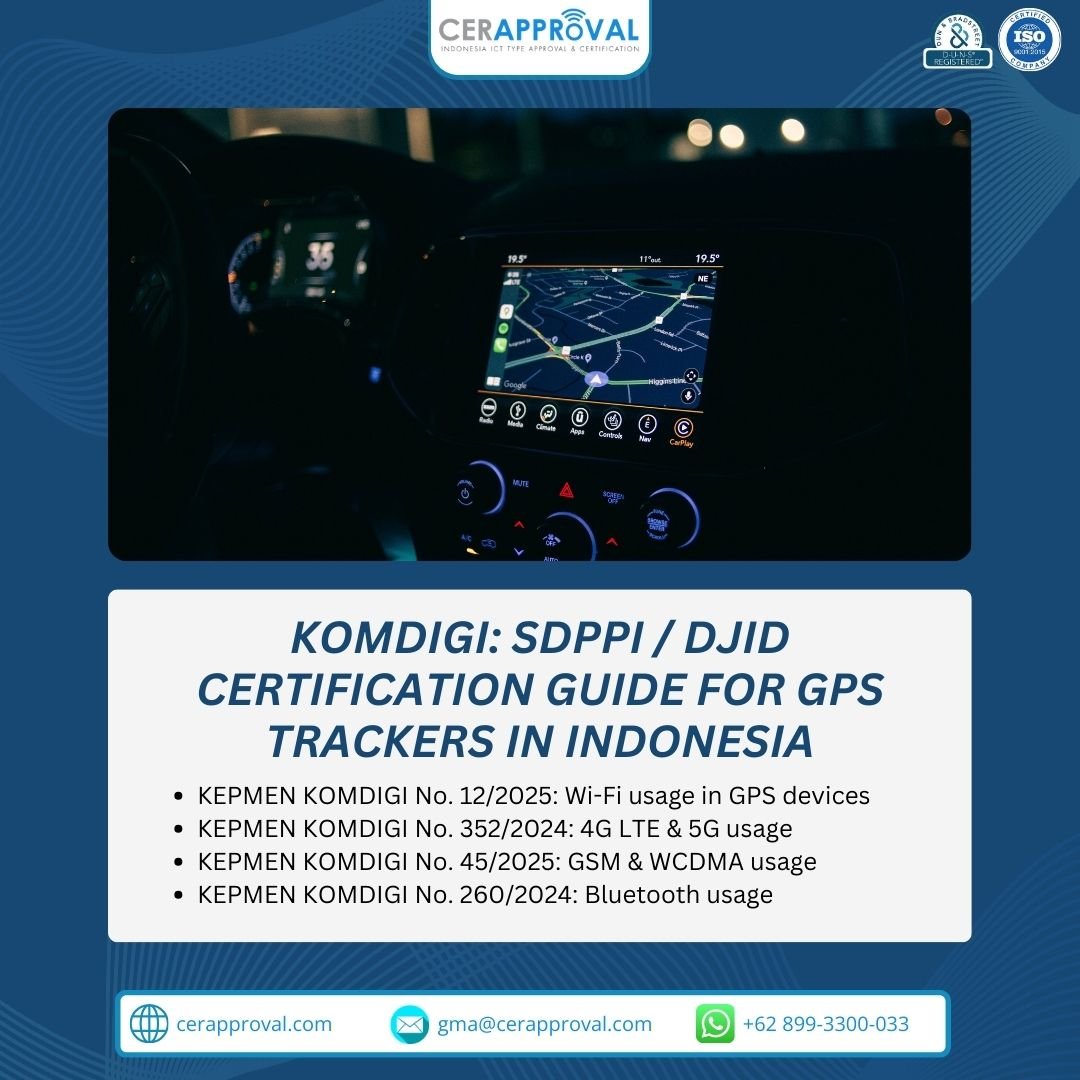
KOMDIGI: SDPPI / DJID Certification Guide for GPS Trackers in Indonesia
If you manufacture, import, or sell GPS tracker devices in Indonesia, you are legally required to obtain SDPPI (Postel) certification issued by the Directorate General of Digital Infrastructure (DJID) under KOMDIGI – the Ministry of Communication and Digital Affairs. This regulation is part of the government’s efforts to control and ensure all telecommunication equipment meets national technical standards. What Is a GPS Tracker? GPS Tracker is an electronic device that uses Global Positioning System (GPS) satellites to track and monitor the real-time location of an object. Common Uses of GPS Trackers: Vehicle Tracking: For personal cars, trucks, motorbikes, and
-
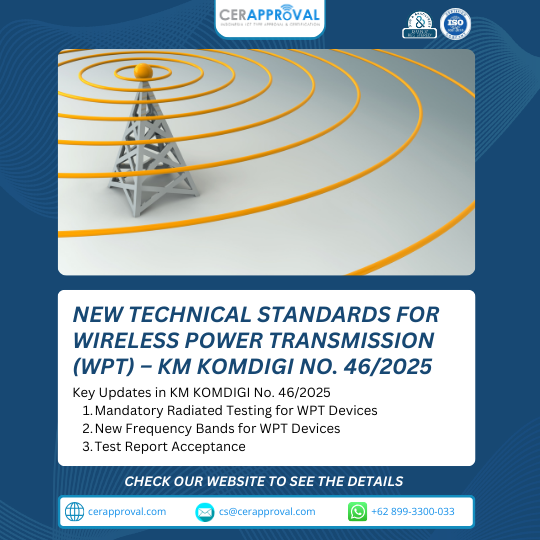
New Technical Standards for Wireless Power Transmission (WPT) – KM KOMDIGI No. 46/2025
The Indonesian Ministry of Communication and Digital (KOMDIGI) has issued Ministerial Decree No. 46 of 2025, which sets new technical standards for Wireless Power Transmission (WPT) devices. This regulation replaces KM 260/2024 and took effect on February 18, 2025. Key Updates in KM KOMDIGI No. 46/2025 Mandatory Radiated Testing for WPT Devices All Wireless Power Transmission (WPT) devices are now required to undergo radiated testing to ensure compliance with the latest technical standards. New Frequency Bands for WPT Devices The regulation introduces three additional frequency bands for Wireless Power Transmission (WPT): 🔹 315-405 kHz 🔹 1700-1800 kHz 🔹 13.553-13.567 MHz
-
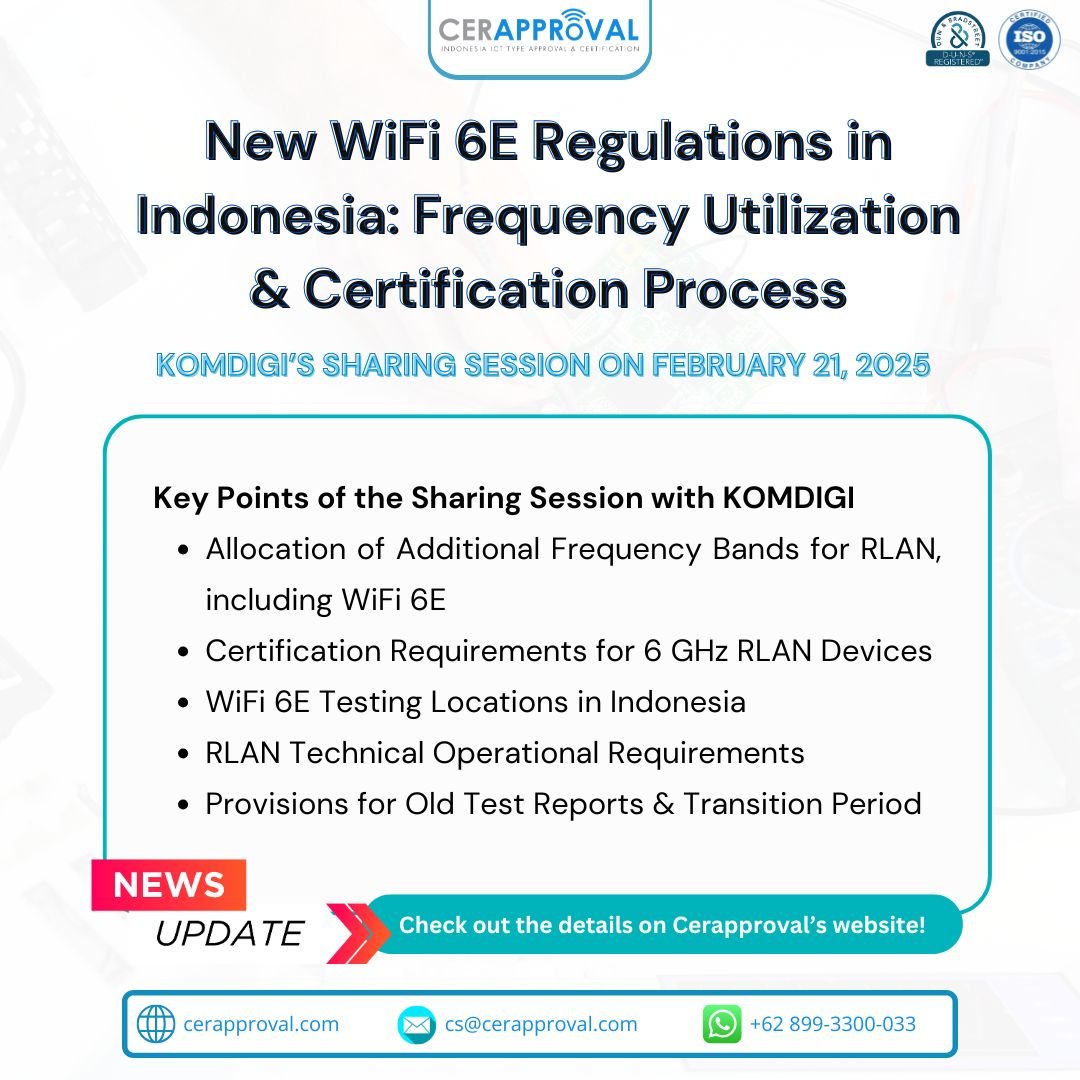
New WiFi 6 GHz Regulations in Indonesia: Frequency Utilization & Certification Process
In 2025, Indonesia adopted new regulations regarding the use of additional frequency bands for Radio Local Area Network (RLAN) technology, including WiFi 6E (IEEE 802.11ax). These regulations are outlined in Ministerial Regulation of Communication and Digital No. 2 of 2025 and Ministerial Decree of Communication and Digital No. 12 of 2025. Designation of Additional Frequency Bands for RLAN Indonesia has now designated the 5925-6452 MHz band for RLAN technology, including WiFi 6E. The regulations are detailed in PM No. 2/2025, with key points as follows: The additional frequency band for RLAN has been designated within the 5925-6452 MHz range. The
-
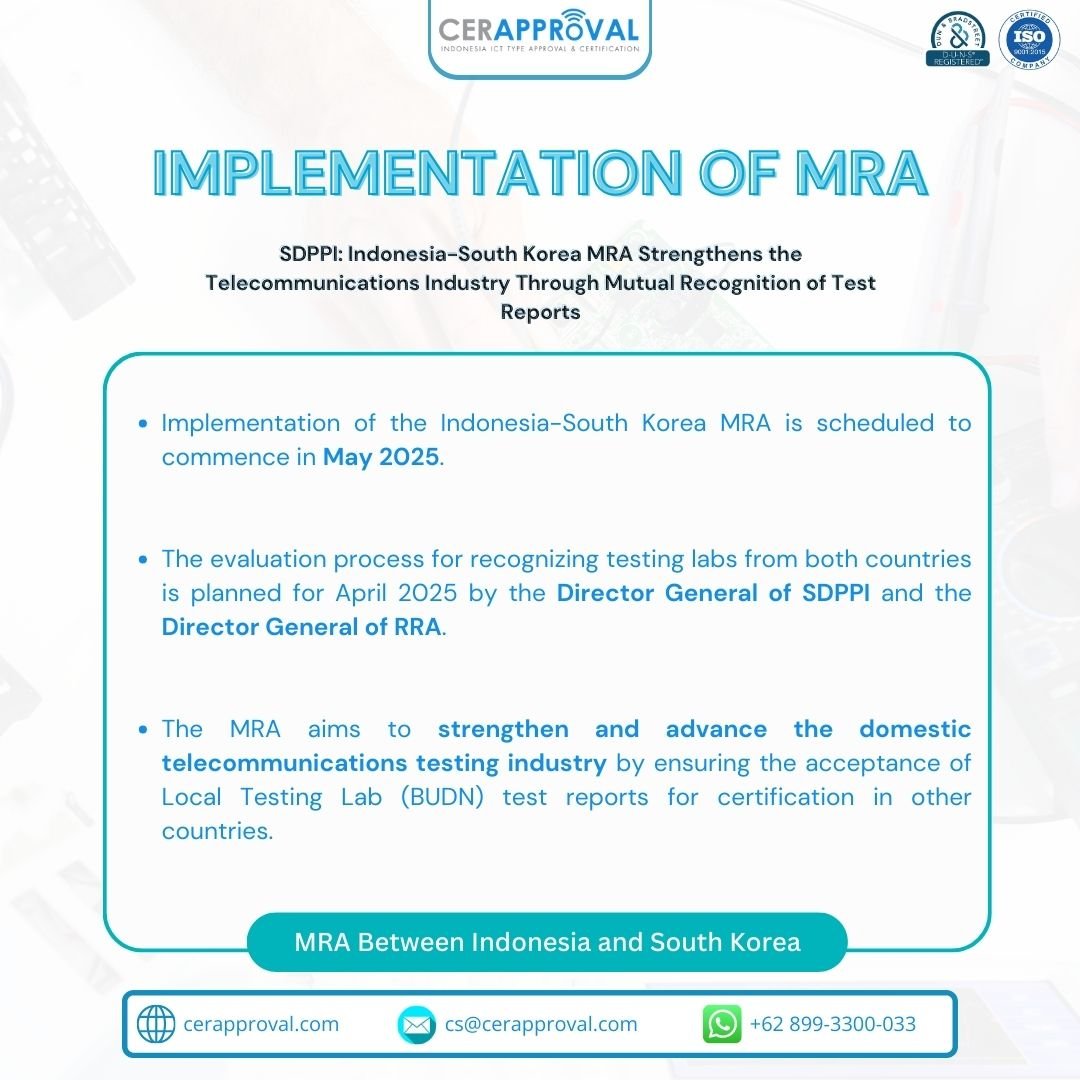
SDPPI: Indonesia-South Korea MRA Strengthens the Telecommunications Industry Through Mutual Recognition of Test Reports
The rapid digital transformation in Indonesia has led to the emergence of various telecommunications devices in the market. To simplify processes and advance the domestic telecommunications industry, the Ministry of Communication and Informatics (Kominfo), through the Directorate General of Resources and Equipment of Post and Informatics (Ditjen SDPPI), is collaborating with South Korea’s Ministry of Science and ICT (MSIT) to establish mutual recognition of telecommunications device test results. Advancing the Mutual Recognition Arrangement (MRA) Between Indonesia and South Korea From September 23 to 27, 2024, the Directorate of PPI Standardization conducted a working visit to Seoul. The visit focused on
-
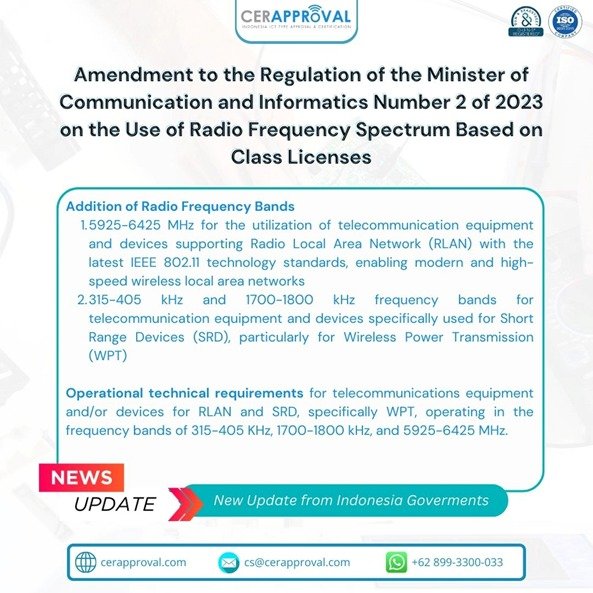
New Technical Regulations for RLAN and WPT on Radio Frequency Spectrum in Indonesia
The Ministry of Communication and Digital is drafting new regulations that will amend the existing Ministerial Regulation No. 2 of 2023 regarding the use of radio frequency spectrum based on class licenses. These changes are intended to align with the latest technological advancements and operational requirements. Key Updates in the Draft Regulation The proposed Ministerial Regulation Draft (RPM) introduces new provisions for the use of radio frequency spectrum, focusing on: Addition of New Frequency Bands: 5925–6425 MHz: For Radio Local Area Network (RLAN) devices based on the latest IEEE 802.11 standards. 315–405 kHz and 1700–1800 kHz: For Short Range Devices
-
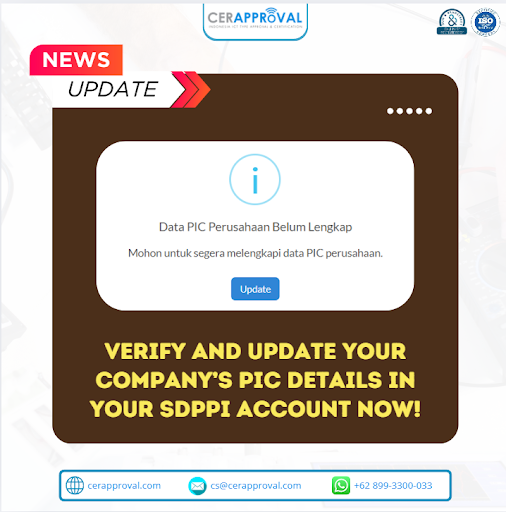
Update Your Company’s PIC Data in the SDPPI Postel Certification Account
The Directorate General of Resources and Equipment of Post and Informatics (SDPPI) once again reminds all companies to immediately update the Person-in-Charge (PIC) data in their respective certification accounts. This step aims to ensure the completeness and accuracy of the profile data recorded on the official SDPPI Postel certification website. What Information Needs to Be Updated? To keep your company’s profile accurate, update the following details: Email Address WhatsApp Number PIC Name PIC Job Title Profile Picture How to Update Your Company’s PIC Data? Updating your company’s PIC data is quick and straightforward. Follow these steps: Login to Your Postel


The Wayang Office Plaza, 5th Floor
Jl. Kedondong No. 5A, RT.11/RW.9
Rawamangun, Pulo Gadung
East Jakarta, DKI Jakarta 13220
Indonesia

Telp: +6221 388-590-01
WhatsApp: +62 899-3300-033
WhatsApp SNI: +62 857-7042-1713

Opening : Mon – Fri, 8:00 – 16:00
Category: SDPPI
Ready To Start New Project With Intrace?
Lorem ipsum dolor sit amet, consectetur adipiscing elit, sed do eiusmod tempor incididunt ut labore et dolore magna aliqua.
